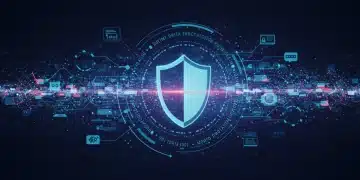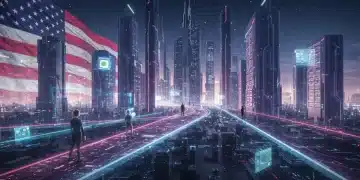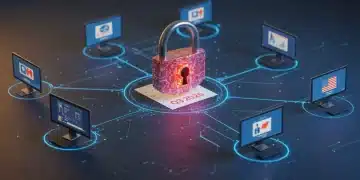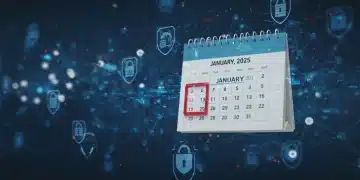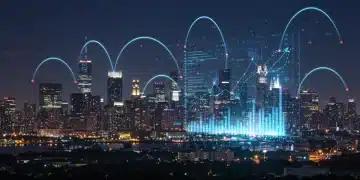House panel report on AI copyright disputes raises concerns
The House panel report on AI copyright disputes highlights critical concerns for creators, emphasizing the need for updated copyright laws to address authorship, ownership, and the protection of original works in an evolving digital landscape.
The House panel report on AI copyright disputes brings to light significant concerns about the balance between innovation and intellectual property rights. As technology evolves, how do we protect creators while encouraging development?
Overview of AI copyright disputes
Understanding the overview of AI copyright disputes is essential in today’s technology-driven world. As artificial intelligence grows, it raises complex questions about intellectual property rights.
The use of AI in creating content can clash with existing copyright laws. Many artists and creators are concerned about how their work might be used without permission. Making sense of these disputes is crucial for everyone involved.
The key issues at stake:
- Authorship: Who owns the copyright when AI creates art or music?
- Ownership: Can AI-generated content be legally owned by anyone?
- Fair use: Does AI use existing works fairly, or is it infringing?
These challenges can create a tricky situation for creators. For example, when an AI model is trained on a specific artist’s work, it can inadvertently produce similar outputs. This leads to questions about whether the AI’s output is considered original or derivative.
Lawmakers are now tasked with updating copyright laws to keep up with technological advancements. A balance must be struck that protects creators while allowing the benefits of AI technology to flourish.
Potential impacts on creators:
Artists, writers, and musicians may find themselves in a position where their work is replicated or imitated by AI. This can affect their income and creative control over their own creations. Additionally, as AI becomes more popular, establishing clear guidelines is vital.
As we delve deeper into these issues, it becomes clear that education and awareness about AI copyright disputes are essential for creators and users of AI alike. Understanding these disputes can help individuals navigate the changing landscape of content creation and copyright law.
Keeping an eye on developments in legislation regarding AI and copyright will benefit all stakeholders in this evolving field. More discussions need to occur to address these critical concerns and ensure the future of creative work is protected.
Key findings from the House panel report

The key findings from the House panel report reveal essential insights into the world of AI and copyright issues. One critical point is the need for clarity in copyright law as it relates to AI-generated content. The complexities surrounding authorship and ownership of AI works have become increasingly significant.
Data suggests that many creators feel vulnerable due to potential misuse of their works by AI. The report highlights that clear guidelines are necessary to protect artists while allowing AI to innovate.
Major findings include:
- Confusion about authorship: Who is the true creator of AI-generated content?
- Lack of legal protections: Current laws may not adequately protect original creators.
- AI’s impact on creativity: AI can both inspire and infringe upon human creativity.
The report emphasizes the urgency for lawmakers to address these findings. With the rapid advancement of AI technologies, the potential for conflict between human creators and AI systems grows. It’s vital to consider how to properly attribute AI-generated works.
Furthermore, the findings suggest the necessity for an update in the legal framework to stay relevant with the evolving digital environment. Legal experts are calling for discussions that involve various stakeholders, including artists, tech innovators, and policymakers.
Creativity should be safeguarded while allowing technological advancements. As the conversation continues, there is hope for finding a path that nurtures creativity, respects copyrights, and embraces innovation. The relationship between AI and copyright remains a critical area of focus for regulators and society.
Impact on content creators
The impact on content creators due to AI advancements is a growing concern. As AI technology evolves, it changes how creators produce and share their work. Many creators feel threatened by the possibility of their unique styles being mimicked or replicated by AI systems.
This disruption raises substantial questions about ownership and rights. For instance, when AI generates content based on existing creators’ styles, who owns that new creation? The lack of clarity can lead to confusion and fear among artists.
Key impacts include:
- Loss of income: If AI can create content similar to human creators, it may reduce demand for human-generated work.
- Creative control: Some artists worry that their distinctive voices might be overshadowed by AI-generated alternatives.
- Legal challenges: Copyright issues may arise when AI outputs mimic original works, leading to disputes over rights.
As the landscape changes, understanding the effects of AI on creativity is crucial. The role of human artists may evolve, but that doesn’t mean their contributions should diminish. Creators are beginning to explore ways to collaborate with AI rather than view it solely as competition.
This collaboration could manifest in various ways, such as using AI to generate ideas or assist in the creative process. By doing this, artists can leverage AI as a tool rather than see it as a threat to their livelihoods.
Moving forward, the dialogue must focus on how to adapt to these changes while ensuring content creators feel secure and valued in their work. Emphasizing the importance of human creativity can help maintain a balance between innovation and respect for the original creators.
Future implications for AI and copyright law

The future implications for AI and copyright law are significant as technology continues to advance. As AI tools become more integrated into creative processes, the need for updated legal frameworks becomes critical. Current copyright laws often struggle to keep pace with rapid technological changes.
One of the main concerns is how AI-generated content will be treated under existing copyright legislation. Will the outcomes produced by AI be eligible for protection? This question raises vital issues about authorship and ownership, especially when AI systems are trained on existing works.
Potential developments in AI copyright law:
- Revising ownership rights: Laws may evolve to clarify who holds the rights to AI-generated works.
- New definitions of authorship: Legal definitions may need to change to accommodate AI’s role in creativity.
- Enhanced protections for creators: Laws could be adjusted to offer better safeguards for original content.
As society navigates these challenges, collaboration between lawmakers, tech developers, and creators will be essential. Understanding how AI influences creativity is important for relevant parties to make informed decisions about future regulations.
Furthermore, there is a growing emphasis on ethical considerations in AI development. Stakeholders are increasingly recognizing the necessity of creating a fair environment that respects original creators while fostering innovation. Having open dialogues and inclusive discussions is key to shaping a balanced approach.
Looking ahead, it’s clear that copyright law will not only have to adapt but also embrace the advancements that AI brings. By prioritizing collaboration and understanding, the future can find a harmonious solution that respects both the technological benefits and the rights of content creators.
FAQ – Questions about AI and Copyright Law
What are the main concerns for content creators regarding AI?
Content creators worry about losing income and creative control as AI can replicate their styles and reduce demand for human-generated work.
How might copyright laws change due to AI advancements?
Copyright laws may need to be revised to clarify ownership and authorship of AI-generated content, ensuring protections for original creators.
Can artists collaborate with AI?
Yes, artists can use AI as a tool to enhance their creativity, helping to generate ideas and support their creative processes.
What ethical considerations should be addressed in AI development?
Ensuring fairness and respecting the rights of original creators is vital, fostering an environment that balances innovation and copyright protection.
